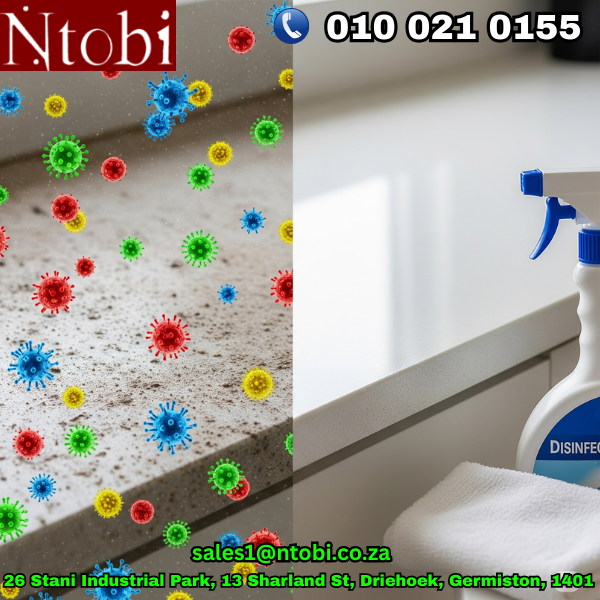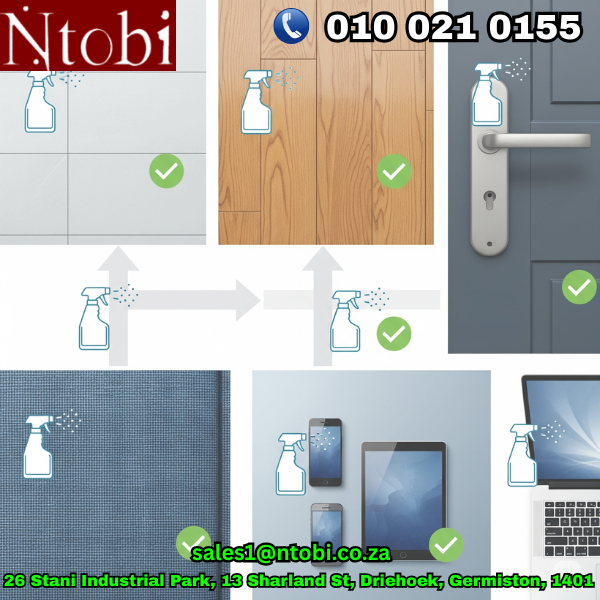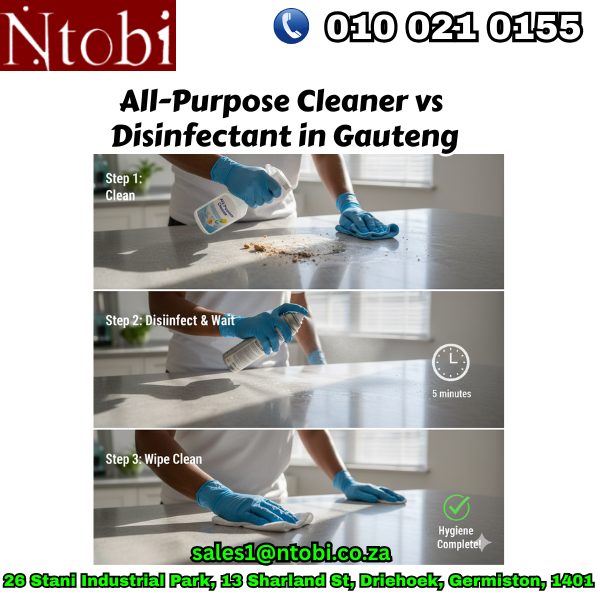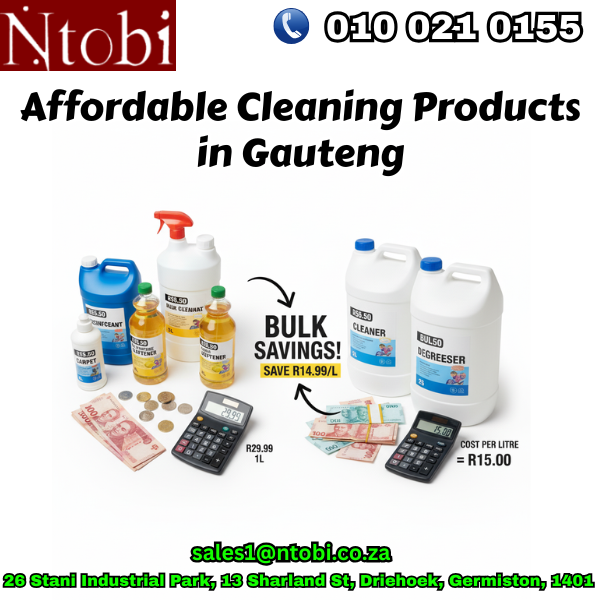Disinfectant liquid cleaners serve as essential tools for maintaining hygiene standards across Gauteng’s homes, offices, and commercial spaces. These powerful solutions eliminate harmful microorganisms whilst providing long-lasting protection against bacteria, viruses, and fungi that threaten public health.
The unique climate conditions in Gauteng, with its warm temperatures and occasional humidity, create ideal breeding grounds for pathogens – making regular disinfection absolutely crucial for residents and businesses alike.
We specialise in providing Gauteng with premium cleaning solutions through Ntobi’s comprehensive range of disinfectants, bulk cleaning supplies, and professional carpet cleaning liquids. Our products are specifically formulated to tackle the cleaning challenges that Gauteng’s diverse environments present, from industrial facilities in Johannesburg to residential complexes in Pretoria.
Understanding Disinfectant Liquid Cleaners
Disinfectant liquid cleaners work through active ingredients that disrupt cellular structures of microorganisms. The most common active ingredients include quaternary ammonium compounds, alcohol-based solutions, and chlorine derivatives. Each type targets different pathogens with varying contact times and effectiveness levels.
Professional-grade disinfectants differ significantly from household varieties. They contain higher concentrations of active ingredients and often require specific dilution ratios for optimal performance. This concentration difference explains why commercial establishments rely on professional cleaning supplies rather than supermarket options.
The pH levels of disinfectants also play a crucial role in their effectiveness. Neutral pH formulations work well for daily maintenance, whilst alkaline solutions tackle grease and protein-based contaminants more effectively. Understanding these chemical properties helps users select the right product for their specific cleaning requirements.
Health Benefits of Regular Disinfection
Regular disinfection provides immediate and long-term health benefits for Gauteng residents. Medical facilities, schools, and offices that implement consistent disinfection protocols report significantly lower rates of infectious diseases. This reduction occurs because disinfectants break the transmission cycle of pathogens before they can spread between individuals.
Children and elderly individuals benefit most from regular disinfection routines. Their immune systems often struggle to combat common bacteria and viruses that healthy adults can easily resist. Consistent use of quality disinfectants creates safer environments for these vulnerable populations.
The psychological benefits shouldn’t be overlooked either. Clean, disinfected spaces reduce anxiety and stress levels, particularly in healthcare settings where patients already feel vulnerable. This mental health aspect contributes to faster recovery times and improved overall wellbeing.
Key Health Protection Areas:
- Respiratory infections: Reduced by 60-80% with proper surface disinfection
- Gastrointestinal illnesses: Decreased transmission through contaminated surfaces
- Skin infections: Prevented through elimination of bacterial colonies
- Cross-contamination: Stopped before pathogens can spread between areas
Commercial Applications in Gauteng
Gauteng’s diverse commercial landscape requires tailored disinfection approaches. Manufacturing facilities need products that won’t damage sensitive equipment whilst still providing thorough pathogen elimination. Restaurants require food-safe formulations that meet health department regulations without affecting food quality or taste.
Healthcare facilities represent the most demanding commercial application. These environments require hospital-grade disinfectants that eliminate drug-resistant bacteria and viruses within specific contact times. The consequences of inadequate disinfection in medical settings can be life-threatening, making product selection absolutely critical.
Educational institutions face unique challenges with high traffic volumes and diverse contamination sources. Schools and universities need products that work quickly between classes whilst remaining safe around students. Heavy-duty floor cleaners combined with surface disinfectants provide comprehensive protection for these environments.
Office buildings require solutions that maintain professional appearances whilst providing thorough disinfection. Products that leave residues or strong odours can disrupt business operations, making neutral-scent formulations essential for corporate environments.
Residential Uses Throughout Gauteng Homes
Home disinfection extends far beyond bathroom and kitchen cleaning. Doorknobs, light switches, and remote controls harbour millions of bacteria that family members constantly touch throughout the day. Regular disinfection of these high-touch surfaces prevents illness transmission within households.
Pet owners face additional challenges with bacteria and viruses that animals can introduce into homes. Specialised disinfectants that are safe around pets whilst still eliminating animal-specific pathogens provide essential protection for these households.
Laundry rooms often get overlooked during cleaning routines, yet washing machines and dryers can harbour dangerous bacteria if not properly maintained. Adding disinfectant to washing cycles or using specialised machine cleaners prevents bacterial growth and eliminates odours.
Home offices have become increasingly important since remote work expanded across Gauteng. These spaces require regular disinfection to maintain productivity and prevent illness that could disrupt work schedules.

What Are Disinfectant Cleaners Used For?
Disinfectant cleaners serve multiple purposes across residential and commercial settings. Surface sanitisation remains their primary function, eliminating bacteria, viruses, fungi, and other harmful microorganisms from countertops, floors, walls, and equipment. This broad-spectrum antimicrobial action makes them indispensable for maintaining hygienic conditions.
Food preparation areas require special attention, as foodborne illnesses can have serious health consequences. Disinfectants formulated for kitchen use eliminate Salmonella, E. coli, and other dangerous bacteria that commonly contaminate food surfaces. These products must be food-safe and leave no harmful residues that could affect food quality.
Medical equipment disinfection represents another critical application. Stethoscopes, blood pressure cuffs, thermometers, and other medical devices require thorough disinfection between patients to prevent cross-contamination. Healthcare-grade disinfectants provide the rapid kill times and broad-spectrum coverage necessary for medical applications.
Water system disinfection helps prevent Legionnella and other waterborne pathogens from establishing colonies in cooling towers, hot water systems, and plumbing fixtures. This application requires specialised products that won’t damage system components whilst providing effective microbial control.
What Are the Benefits of Disinfectants?
Disinfectants provide immediate pathogen elimination, typically achieving 99.9% bacterial and viral reduction within minutes of application. This rapid action prevents infection transmission and creates safer environments for occupants. The speed of disinfection makes these products essential for high-traffic areas where contamination occurs frequently.
Cost savings represent a significant long-term benefit of regular disinfection. Preventing illness reduces medical expenses, sick leave costs, and productivity losses that infections cause. Businesses that implement comprehensive disinfection programmes often see substantial returns on their cleaning investments through reduced employee absence rates.
Regulatory compliance becomes achievable through proper disinfectant use. Health departments, food safety agencies, and occupational safety organisations require specific disinfection standards for commercial operations. Quality disinfectants help businesses meet these requirements and avoid costly violations or shutdowns.
Surface protection occurs as an additional benefit of many modern disinfectants. Advanced formulations include ingredients that condition surfaces whilst disinfecting, preventing damage that harsh chemicals might cause. This dual action extends the lifespan of floors, countertops, and equipment whilst maintaining cleanliness.
Economic Benefits:
- Reduced sick leave expenses
- Lower healthcare costs
- Improved productivity
- Regulatory compliance
- Extended surface lifespan
- Enhanced business reputation
Is Disinfectant Cleaner the Same as Bleach?
Disinfectant cleaners and bleach serve similar purposes but differ significantly in formulation, application, and effectiveness. Bleach contains sodium hypochlorite as its primary active ingredient, whilst disinfectant cleaners may use quaternary ammonium compounds, alcohol, hydrogen peroxide, or other antimicrobial agents. This difference affects their performance against various pathogens and their suitability for different applications.
Bleach works exceptionally well against viruses and bacteria but can damage coloured fabrics, metals, and certain surfaces. Disinfectant cleaners often provide gentler action that won’t harm delicate materials whilst still delivering effective pathogen elimination. This versatility makes disinfectant cleaners more suitable for daily use across diverse surfaces.
Contact time requirements also differ between bleach and disinfectant cleaners. Bleach typically requires longer contact times to achieve maximum effectiveness, whilst many modern disinfectants work within 30 seconds to 2 minutes. This speed advantage makes disinfectant cleaners more practical for busy commercial environments.
Safety considerations favour disinfectant cleaners in many situations. Bleach produces harsh fumes that can irritate respiratory systems and requires careful handling to prevent accidents. Many disinfectant cleaners offer similar antimicrobial effectiveness with reduced safety concerns and more pleasant odours.
The environmental impact varies significantly between these products. Bleach breaks down into salt and water but can harm aquatic life if released in concentrated amounts. Many disinfectant cleaners use biodegradable ingredients that pose fewer environmental risks whilst maintaining effectiveness.
What Are Three Uses of Disinfectant?
Healthcare Facility Sanitisation represents the most critical application of disinfectants. Hospitals, clinics, and dental offices rely on these products to prevent healthcare-associated infections that could prove fatal to vulnerable patients. Operating rooms require the highest level of disinfection, with products that eliminate spores, viruses, and drug-resistant bacteria within strict time requirements.
Food Service Safety demands rigorous disinfection protocols to prevent foodborne illness outbreaks. Restaurants, cafeterias, and food processing facilities use disinfectants on cutting boards, preparation surfaces, and equipment to eliminate dangerous bacteria like Salmonella and Listeria. These applications require food-safe formulations that won’t contaminate edible products.
Educational Environment Protection helps schools and universities maintain healthy learning conditions for students and staff. Classrooms, laboratories, libraries, and common areas receive regular disinfection to prevent illness transmission that could disrupt education. Pine gel products often complement disinfectants in these settings for comprehensive cleaning coverage.
Additional applications include:
- Public transportation sanitisation
- Office building maintenance
- Residential bathroom and kitchen cleaning
- Industrial equipment decontamination
- Laboratory surface preparation
- Veterinary facility disinfection

Choosing the Right Disinfectant for Gauteng Conditions
Gauteng’s climate presents unique challenges for disinfection programmes. The region’s altitude affects chemical effectiveness, whilst temperature variations influence product stability and performance. Selecting disinfectants formulated for South African conditions ensures optimal results and value for money.
Water quality variations across Gauteng can impact disinfectant performance. Hard water reduces the effectiveness of some products, whilst high mineral content can interfere with antimicrobial action. Understanding local water conditions helps determine appropriate product concentrations and application methods.
Storage considerations become critical in Gauteng’s climate. Temperature fluctuations can destabilise certain disinfectant formulations, reducing their effectiveness or causing separation. Proper storage facilities and rotation procedures maintain product quality throughout their shelf life.
Professional guidance helps users navigate the complex world of disinfectant selection. Contacting cleaning experts provides access to specialised knowledge about local conditions, regulatory requirements, and product performance characteristics specific to Gauteng applications.
Frequently Asked Questions
How often should I disinfect surfaces in my Gauteng home?
High-touch surfaces like doorknobs, light switches, and countertops require daily disinfection, particularly during flu season or when family members are ill. Bathrooms and kitchens benefit from disinfection after each use, whilst other areas can be disinfected weekly or as needed.
Can I mix different disinfectants for better results?
Never mix different disinfectants, as chemical reactions can produce dangerous gases or reduce effectiveness. Each product is formulated to work optimally on its own, and mixing can create safety hazards or neutralise the antimicrobial action.
Are natural disinfectants as effective as chemical ones?
Natural disinfectants like vinegar and essential oils provide some antimicrobial benefits but typically don’t achieve the broad-spectrum effectiveness of commercial disinfectants. For critical applications like healthcare or food service, chemical disinfectants offer superior pathogen elimination.
How long do disinfectants remain effective on surfaces?
Most disinfectants provide immediate pathogen elimination but don’t offer long-term residual protection. Surfaces become vulnerable to recontamination as soon as they’re touched or exposed to new pathogens. Regular reapplication maintains protective benefits.
What’s the difference between cleaning and disinfecting?
Cleaning removes visible dirt and debris but doesn’t necessarily eliminate microorganisms. Disinfecting specifically targets and destroys bacteria, viruses, and fungi. Effective hygiene requires both cleaning and disinfecting for optimal results.
For more information about professional disinfectant solutions in Gauteng, explore our comprehensive cleaning product range and expert guidance to maintain the highest hygiene standards in your facility.







Leave a Reply